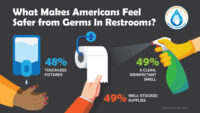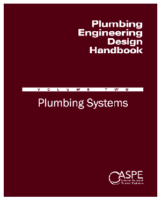Most Americans seek out – and spend more – at businesses with good bathrooms while canceling businesses with messy ones Businesses that fail to keep their restrooms clean and maintained are unwittingly flushing away customers’ repeat business and sales. According to the Healthy Handwashing Survey™ from Bradley Corporation, almost 60% of Americans make it a point to Read more
sanitary

Most Americans seek out – and spend more – at businesses with good bathrooms while canceling businesses with messy ones
Businesses that fail to keep their restrooms clean and maintained are unwittingly flushing away customers’ repeat business and sales. According to the Healthy Handwashing Survey™ from Bradley Corporation, almost 60% of Americans make it a point to stop at a business and will spend more money at the establishment if they know it has clean and maintained restrooms.

In fact, those age 25-44 are even more likely to shell out more cash based on the condition of a business’ restroom.
Conversely, there are negative business repercussions for experiencing a restroom in poor condition. More than half of Americans say an unclean or unpleasant public bathroom shows poor management and causes them to lower their opinion of the overall establishment. The 55+ age group is especially turned off by unkempt restrooms with more than 60% reporting a damaged impression of the overall business.
Almost 20% say a sloppy restroom actually makes them less likely to clean up after themselves.
The business fallout of unpleasant restrooms
Perhaps most damaging for customer-facing businesses is that 52% say a bad restroom experience causes them to vow not to return in the future or think twice about doing so. Another 32% will either tell a friend or post a comment on social media about the negative encounter.
While there are a variety of restroom maintenance issues that may tarnish customers’ restroom experiences, the most common ones include clogged or unflushed toilets; an overall appearance that is old, dirty or unkempt; unpleasant smells; and empty or jammed dispensers for soap, toilet paper and hand towels.
“Restroom maintenance may seem like a business no brainer but limited budgets and facility staffing issues mean that companies are doing more with less staff and resources,” says Jon Dommisse, vice president of marketing and corporate communication, Bradley Corporation. “Nevertheless, customers place a high value on clean restrooms – and reward businesses that offer them. It’s incumbent upon facility managers to prioritize regular restroom cleaning and make sure that everything is in good working order.”

Understanding the aversion to touching restroom surfaces
“In 2023, Americans continue to be in an elevated state of germ consciousness and don’t like touching things in shared public restroom spaces,” adds Dommisse. “As a result, people use all sorts of techniques to avoid coming into contact with surfaces.”
62% use a paper towel to avoid touching toilet flushers and faucet and door handles. 43% operate the flusher with their foot. 31% hover over the toilet seat and 27% open and close doors with their behind to eliminate contact. Women are considerably more likely than men to use these evasive actions.
With so many people deliberately avoiding contact with restroom surfaces, it’s not surprising that 82% believe it is important to have touchless fixtures in a public restroom. Another 60% are more likely to return to a business that offers touch-free technology like faucets, flushers, soap and towel dispensers in its restrooms.
“When asked what restroom improvements they’d like to see, cleanliness topped the list,” Dommisse said. “After that, Americans want touchless fixtures and better stocking of supplies, such as toilet paper, soap and paper towels.”

The annual Healthy Handwashing Survey from Bradley Corp. queried 1,025 American adults Jan. 4-10, 2023, about their handwashing habits, concerns about the coronavirus and flu and their use of public restrooms. Participants were from around the country and were fairly evenly split between men (45%) and women (55%).
For more information, visit www.bradleycorp.com/handwashing.

The American Society of Plumbing Engineers (ASPE), the foremost authority on plumbing engineering and design, has released the latest updated volume in its Plumbing Engineering Design Handbook series: Volume 2: Plumbing Systems. The profession’s leading reference text, ASPE’s Plumbing Engineering Design Handbook (PEDH) encompasses more than 50 chapters in four volumes and provides comprehensive details of Read more
| The American Society of Plumbing Engineers (ASPE), the foremost authority on plumbing engineering and design, has released the latest updated volume in its Plumbing Engineering Design Handbook series: Volume 2: Plumbing Systems. |
The profession’s leading reference text, ASPE’s Plumbing Engineering Design Handbook (PEDH) encompasses more than 50 chapters in four volumes and provides comprehensive details of the accepted practices and design criteria used in the field of plumbing engineering. Volume 2 covers the most commonly found plumbing systems in commercial facilities, including sanitary, domestic hot and cold water, venting, storm drainage, fuel gas, water and wastewater treatment, and more. Whether you want to learn about the right design practices or the engineering change order process, you can find everything you need to know in the latest guide. The engineering handbook has everything you need to know about business and residential plumbing and engineering. How to Access Volume 2The PEDH is one of ASPE’s most valuable member benefits, and ASPE members can access all four volumes as eBooks for free. Nonmembers can purchase the Volume 2 eBook for $259.95, but a better option is to join ASPE to gain access to the entire series for free, a savings of more than $800. To join the ASPE family and take advantage of all of our professional development and career-enhancing benefits, visit ASPE.org. |

This is the first of McWane Plumbing Technical Services ‘How-To’ video series to learn more about cast iron soil pipe and fittings. https://youtu.be/_CZW2ZhhKik McWane Plumbing Technical Services is a full-range service organization that provides educational and technical support on codes and standards as well as regulations that cover cast iron soil pipe and fittings, gaskets and couplings Read more
This is the first of McWane Plumbing Technical Services ‘How-To’ video series to learn more about cast iron soil pipe and fittings.
McWane Plumbing Technical Services is a full-range service organization that provides educational and technical support on codes and standards as well as regulations that cover cast iron soil pipe and fittings, gaskets and couplings, and drainage products for storm and sanitary drain, waste, and vent (DWV) plumbing systems. This service is provided at no cost. Tech Services plays an active role by offering assistance to those interested in better understanding the benefits of using a cast iron plumbing system in a building application.

